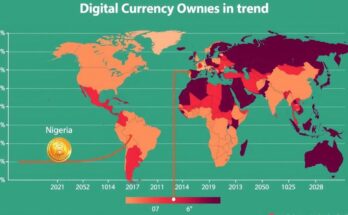Approximately 5,000 Kenyans are stranded in Qatar without jobs or funds, a situation arising from fraudulent recruitment agencies. Labour Cabinet Secretary Alfred Mutua has announced significant reforms to protect citizens, including a ban on upfront fees and new job opportunities in various sectors. The Kenyan government aims to help up to 200,000 citizens find skilled work in Qatar in the coming years.
Approximately 5,000 Kenyan citizens are currently stranded in Qatar, facing unemployment and financial difficulties. This alarming situation was disclosed by Kenya’s Labour Cabinet Secretary, Alfred Mutua, during his recent appearance on Citizen TV. He attributed these hardships largely to fraudulent recruitment agencies that lured Kenyans with misleading promises of lucrative job opportunities abroad. Many of these individuals traveled to Qatar for the 2022 FIFA World Cup but have been unable to return home since the conclusion of the tournament. Stranded Kenyan citizens are reportedly relying on daily aid from the International Organization for Migration. The recruitment process typically required substantial financial investments, with agencies charging job seekers between 200,000 and 250,000 Kenyan shillings for short-term positions lasting approximately three months. Due to the significant fees incurred, many Kenyans find themselves unable to afford the journey back to their homeland. In their desperation, some have chosen to stay in Qatar, hoping for better employment options, while others have suffered severe financial losses after liquidating assets such as land and livestock or accruing considerable debt to finance their recruitment fees. Corruption has been highlighted as a primary factor contributing to this crisis, with Mutua, who has previously served in the Ministry of Foreign and Diaspora Affairs, emphasizing the urgent need for reforms to protect citizens from exploitative practices. His ministry’s new recruitment policy now mandates that job interviews be conducted at no cost, allowing applicants to incur only legitimate expenses, such as medical and administrative fees. Moreover, the Kenyan government has instituted measures to curb the involvement of unauthorized agents and has prohibited the collection of upfront fees. In a progressive step, a Qatari company has committed to providing 8,000 job vacancies across a range of sectors, including hospitality, healthcare, and construction, with an immediate filling of 3,000 positions. The government’s long-term strategy aims to facilitate employment opportunities for 200,000 Kenyan professionals in Qatar over the next few years, particularly focusing on skilled labor in sectors such as nursing, engineering, and information technology, representing a significant shift from previous labor export patterns centered on low-waged, unskilled jobs. The Ministry of Labour and Social Protection continues its efforts to safeguard the interests of Kenyan citizens while ensuring accountability for victims of fraud. The success of these initiatives will be contingent upon effective collaboration among government agencies, the local community, and those directly affected by this crisis.
The article highlights the severe plight faced by approximately 5,000 Kenyans stranded in Qatar due to misleading recruitment practices. As many had traveled for the 2022 FIFA World Cup, they fell victim to fraudulent agencies luring them with false promises of stable employment opportunities. Following their arrival, many found themselves without jobs or financial means to return home, necessitating reliance on international aid agencies. The Kenyan government is now taking corrective measures to prevent such exploitation, implement reforms for safer recruitment practices, and establish legitimate job opportunities in Qatar.
In conclusion, the plight of stranded Kenyans in Qatar underscores the urgent need for infrastructural reforms within international labor recruitment processes. Careful implementation of new policies by the Kenyan government aims to protect job seekers from exploitation and open legitimate avenues for employment abroad. Effective collaboration amongst government entities, the private sector, and affected citizens will be essential in addressing these challenges and preventing similar crises in the future.
Original Source: www.mwakilishi.com




